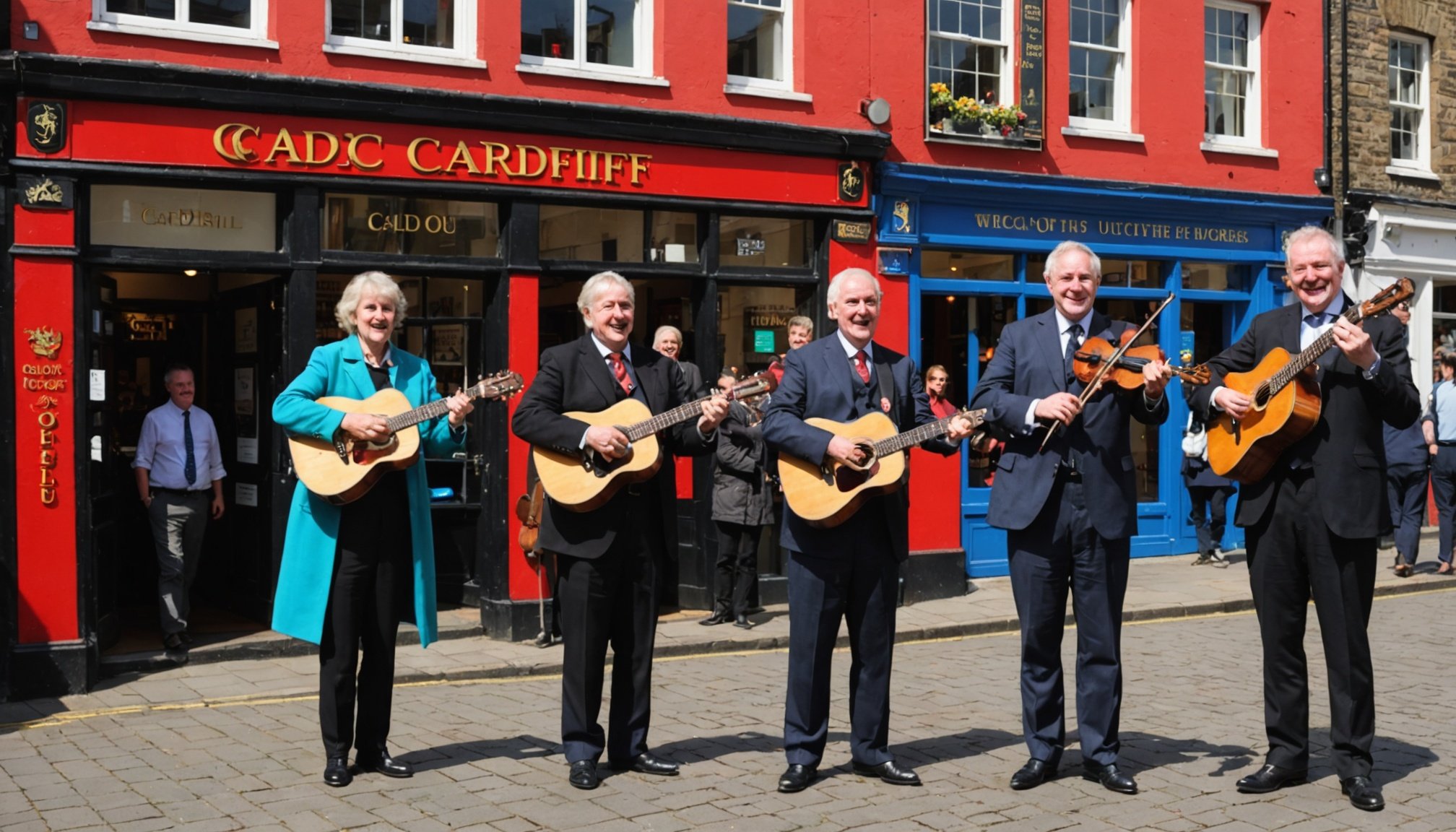Overview of Traditional Welsh Music
Traditional Welsh music holds cultural significance rooted in a rich musical heritage. Tracing back centuries, it has evolved within the distinct landscape of Wales. The mountainous terrain and rugged coastlines have shaped its musical styles, resulting in uniquely resonant sounds and rhythms. Traditional music often utilised the Welsh harp and fiddles, alongside vocal harmonies reflecting the natural surroundings.
Historically, music has played a pivotal role in defining Welsh culture and identity. It serves as an aural tapestry of folklore and community history. Songs like “Ar hyd y nos” (All Through the Night) and “Suo Gân” are deeply ingrained in national consciousness, celebrating pastoral life and emotional depth. Communities used music to tell stories, educate, and preserve language.
In the same genre : The Ultimate Guide to Creating a Memorable Glamping Getaway in Suffolk’s Scenic Countryside
Furthermore, geography influenced musical diversity. The north, known for its ballads and harp music, contrasts with the south’s lively dance tunes. Such variations echo Wales’ historical divisions and local traditions. Music acts as a societal mirror, reflecting the people’s resilience, aspirations, and communal spirit. Through traditional Welsh music, a narrative of resilience and pride shines, illuminating its enduring legacy.
Key Traditional Welsh Tunes
Exploring popular Welsh tunes offers a journey through the traditional music repertoire that reflects the nation’s pride and history. These iconic songs encapsulate the essence of Welsh identity and cultural roots.
Additional reading : Unearth Royal Treasures: The Definitive Guide to Booking Your VIP Buckingham Palace Tour
Overview of Iconic Songs
Welsh music boasts a collection of songs that are iconic and emblematic. “Hen Wlad Fy Nhadau” serves as a potent national anthem, stirring emotions and national pride. Songs like “Dafydd y Garreg Wen” (David of the White Rock) and “Sosban Fach” use storytelling to capture local folklore and community spirit. These pieces have transcended time, maintaining relevance through their evocative narratives.
Notable Composers and Artists
Notably contributing to Welsh music’s identity are composers like T. Osborne Roberts, who enriched the traditional repertoire with melodic contributions. Similarly, artists who keep these melodies alive play crucial roles in shaping and preserving traditional expressions. Notable performers include folk singers who interpret these classics with modern sensibilities, ensuring their enduring presence in contemporary settings.
Regional Variations in Tunes
Across Wales, song variants reveal regional differences. The north often features serene melodies, while the south offers more vibrant dance-like tunes. Such distinctions echo historical development, influenced by geographical and cultural shifts, enriching the diversity of traditional Welsh music.
Historical Context of Welsh Music
Understanding the history of Welsh music provides insight into its rich evolution and the enduring legacy of its folk traditions. Welsh music has evolved over centuries, influenced by pivotal social and political changes that mirrored life in Wales.
In the past, traditional Welsh music functioned as an essential vessel of expression and communication, reacting to societal shifts. During the 19th century, the industrial revolution sparked a period of intense social transformation. This era saw music adapting, with themes reflecting the struggles and perseverance of the Welsh workforce. As political and economic landscapes changed, so too did the music, which started to embrace a broader array of expressions and instruments.
Efforts to preserve traditional music have been ongoing, particularly important for maintaining cultural continuity. Societies and music enthusiasts have contributed significantly by documenting, teaching, and reviving traditional songs and styles. This preservation acts as a cultural anchor, ensuring that the evolution of sound maintains its roots while adapting to modern influences.
Through these transitions, Welsh music has managed to keep its core identity intact, a testament to its resilience and cultural importance. This dynamic history highlights the adaptability of Welsh folk traditions amidst the changing tides of time.
Cultural Impact of Welsh Music
The cultural influence of traditional Welsh music is profound, intertwining deeply with national identity. This music serves as a pillar in defining Welsh national identity, often echoed in community events and festivals that celebrate the country’s heritage. Songs and melodies from the past are woven into the fabric of such events, acting as a connector between generations, telling stories of the land’s history and ideals.
Traditional music’s societal relevance shines through its presence in festivals like the National Eisteddfod, where music competitions and performances bring the community together. These events not only preserve heritage but also engage with young audiences, ensuring the continuity of Welsh music culture.
Moreover, traditional Welsh music influences contemporary artists. Many artists draw inspiration from these timeless sounds, integrating them into modern compositions, which keeps these ancient tunes alive. This fusion creates a bridge between tradition and modernity, inviting younger audiences to explore their cultural roots through music.
The relationship between music and Welsh national identity underscores its role in strengthening community bonds and fostering pride. As traditional music informs contemporary expressions, it reinforces cultural heritage and ensures its presence in everyday life.
Music Venues and Events in Cardiff
Experience the vibrant music scene in Cardiff, where venues and events create cultural experiences that celebrate Welsh heritage. Known for its rich blend of traditional and contemporary sounds, Cardiff offers music enthusiasts a variety of options.
Popular Venues for Traditional Welsh Music
Cardiff boasts several popular venues where traditional Welsh music thrives. St David’s Hall, known for its acclaimed performances, offers a stage for both emerging and established artists. Smaller, intimate spaces like The Royal Welsh College of Music and Drama provide platforms for traditional tunes, fostering an appreciation for the musical heritage.
Annual Music Festivals Celebrating Welsh Heritage
Cardiff hosts annual music festivals, showcasing traditional Welsh music and culture. The National Eisteddfod, one of Europe’s largest cultural festivals, celebrates nearly every August. This event features diverse performances and competitions, acting as a cornerstone for Welsh artistic expression.
Tips for Attending Live Music Events
To enhance your experience, consider booking tickets in advance for popular shows and exploring Cardiff’s local venues. Attend events with an open mind to discover diverse musical expressions. Engaging with the community can also offer insights into the cultural significance of the performances, enriching your exploration of Welsh music.
Discovering and Experiencing Welsh Music
Exploring Welsh music provides an enriching journey into the cultural experiences and sounds that define the nation’s rich heritage. For those eager to delve into this vibrant world, numerous music resources offer an accessible entry point.
Playlists curated on platforms like Spotify and Apple Music serve as excellent starting points, providing an eclectic mix of traditional and contemporary tunes. These collections can help listeners immerse themselves in both the historical roots and modern expressions of Welsh music. Notable playlists often include iconic songs alongside newer interpretations, creating a bridge between past and present.
To fully embrace the local scene, visiting Cardiff’s music venues during live events offers an authentic experience. Engage with local artists and enthusiasts, providing a deeper understanding of the music’s societal role.
For those interested in learning traditional Welsh music, various online tutorials, workshops, and cultural experiences are available. Institutions like the National Eisteddfod offer workshops and resources, making it easier to master traditional instruments or vocal styles.
Experiencing Welsh music, whether through playlists or live performances, facilitates a deeper appreciation for its enduring legacy and evolving cultural impact.
Contributions of Modern Artists
Modern Welsh artists have taken on the mantle of preserving traditional tunes while infusing them with fresh fusion styles. Innovators like Gruff Rhys merge old and new, creating rich contemporary influences that captivate audiences. By weaving traditional elements with modern beats, these artists expand the reach of Welsh music beyond its geographical borders.
One way that modern musicians accomplish this is through collaborations with artists from diverse genres. This cross-genre engagement broadens the appeal of Welsh music, drawing interest from listeners who may not typically explore traditional soundscapes.
Fusion styles manifest in various ways. For some, it might mean incorporating electronic elements or global rhythms, while others might reinterpret classic songs with contemporary storytelling techniques. This evolution not only keeps the music alive but also maintains its relevance in today’s multifaceted musical landscape.
The role of these modern Welsh artists goes beyond preservation; they’re champions of cultural evolution, ensuring that Welsh heritage resonates with younger generations. As they continue to innovate, they invite listeners into an evolving narrative that both honours the past and embraces the future, promoting greater cultural understanding and appreciation.











